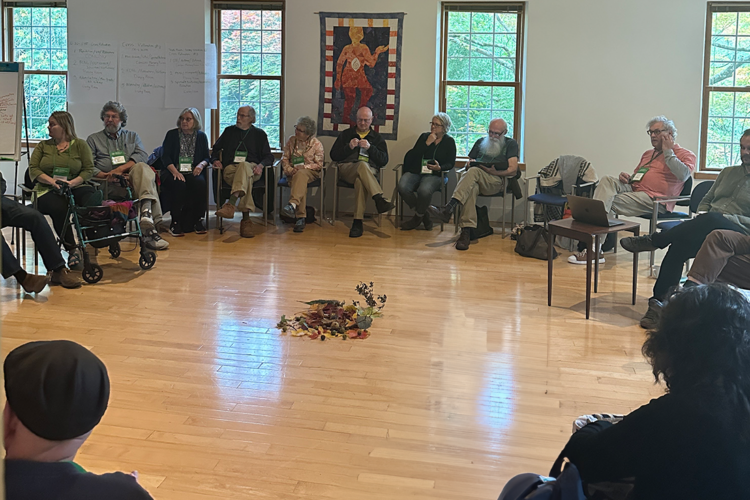Talking about Climate Change: A Call for Dialog

“It is good for thee to dwell deep that thou mayest feel and understand the spirits of people.” —John Woolman (1)
“Let your speech always be with grace, seasoned with salt, that you may know how you ought to answer each one.” —Colossians 4:62 (2)
“Whoever says Thou does not have something; he has nothing. But he stands in relation.” —Martin Buber (3)
Talking about climate change or other critical problems can be difficult, especially when those who are talking differ markedly in religious views or basic assumptions. As Quakers we seek to be inclusive, not in the sense of embracing the whole range of human belief, but in the sense of recognizing “that of God” in everyone, responding to the other as “Thou” rather than “It.” Our aim is koinonia, mutual participation in truth, the source of our differences and the ground of our unity.
How then to proceed as we encounter those who deny our basic premise or who want to evade the subject altogether? Martin Buber and David Bohm, two of the 20th century’s most influential philosophers, both focus on dialogue as the key to becoming fully human and changing, fundamentally, the way people think, and act. If they are right, it behooves us to study and practice dialogue.
Martin Buber I and Thou
For Buber, in I and Thou, the basic problem is that our technological, convenience-driven culture impels us toward treating the other as an object or category—at best a loose bundle of defined qualities. An “It”—whether a substance, a person, or another creature—is classified, “profiled,” subject to analysis and manipulation.
In an I-Thou encounter, we recognize the uniqueness and full being of the other, without reduction to constrictive categories of “same” and “different.” An “I-Thou” relation participates in the indefinable, vital process of an “other.”
Buber sees an I-Thou relation as dialogical, an I-It relation as monological. Monologue is self-centered; the other exists only as a part of one’s own experience. Dialogue centers on an event, a shared experience that may become, for both I and Thou, transformative. (3)
David Bohm On Dialogue
“Meaning is not static—it is flowing.” —David Bohm (4)
For David Bohm, in On Dialogue, thought itself is the problem. We can “fix” climate change or solve the energy problem; but unless we change the way we think, the problem will manifest in some other way. We may suppress the particular symptoms, but the cause continues to fester.
“The object of a dialogue,” insists Bohm, “is not to analyze things or to win an argument, or to exchange opinions”; rather, the object is to listen, stand back and observe the process, “see what all that means.” Dialogue is not a negotiation, a means to compromise; rather, dialogue is a means to apprehend, intuitively, what is “tacit,” prior to all the debate: each party’s unspoken, unexamined assumptions about the other and the subject at hand. (4)
With such a realization comes a release of creativity. Another world, a different relationship, becomes possible.
“The question is: can we all come together about something? Not purpose, goal, god and all that, but the feeling that we are together, first.” —J. Krishnamurti (5)
“Everything that lives is holy.” —William Blake (6)
Witness and Practice
What, then, should be our witness and our practice as Quakers? Here are some practical suggestions, a few steps in a process of dialogue:
- On all occasions, seek to establish trust. Listen carefully and caringly. Suspend judgement. Ask questions and seek clarification. Be a model of what you hope for from the other.
- Identify yourself as a Quaker, a Friend of Truth, seeking to live in peace and to embrace diversity.
- Establish something you and the other have in common, such as frustration, a feeling that something is fundamentally wrong with the way things are, or concern for the future and our children.
- Acknowledge and include difference; don’t evade it. Speak as you are led, and be ready to change your ideas, as well as your assumptions about the other.
- If you summarize, be inclusive of agreements, disagreements and puzzlements in your dialogue. Keep returning to common ground; relate disagreements to that common ground.
- Dialogue is not just a matter of recognizing “thou” in the other; it’s also a matter of recognizing the “thou” in thoughts and ideas. They too are not “its,” discrete entities to be categorized, enumerated, and marshaled.
- Avoid argument and “discussion,” which shares the same root with “concussion” and “percussion,” all having to do with striking and breaking up. Engage in true dialogue, which emphasizes the process of thought itself as we move toward a future together.
- Your object, in dialogue, is not to save the planet, or to persuade and convince. There is no leader, no topic, no agenda, nothing “to do.” Your object is to communicate, in truth, with the other.
- Don’t worship an opinion, or the hoped-for outcome; those are graven images. Worship truth, which, as Gandhi believed and practiced, is nonviolence and love—not reducing “Thou” to “It”.
- Full communion involves caring for the future, which is our moral responsibility. Avoid moralizing, however. Tell stories about what you care for: children, the earth, and other creatures, caught up with ourselves in the entangling net of climate change, exploitation, impoverishment, joy, and sorrow.
- If you feel at a loss, reflect: you have sown seeds. As the parable tells us, we don’t know which seeds may germinate (Matthew 13:1-9).
- If nothing positive seems to be happening, don’t just break off the dialogue. Summarize briefly and respectfully, and express willingness to continue on another occasion if the other person wishes. You never can tell; it may happen. These, then, are some of the practices that can help us build the beloved, trusting community we need for conversation—and action—on climate change and other difficult topics. True dialogue is difficult to initiate and to sustain. But without dialogue we are unable to commune, in truth, with the other and with the creation—with all that is sacred.
“Now therefore come thou, let us make a covenant, I and thou: and let it be for a witnessbetween me and thee.”—Genesis 31:44
Endnotes
1) John Woolman, The Journal and Major Essays of John Woolman, edited by Phillips P. Moulton, Richmond, IN: Friend United Press (1989).
2) Biblical quotations are from the King James Version.
3) Martin Buber, I and Thou, trans. R. G. Smith (1958).
4) David Bohm, On Dialogue (1996).
5) J. Krishnamurti and David Bohm, The Ending of Time: Thirteen Dialogues (1988). 6) William Blake, The Marriage of Heaven and Hell (1790).
5) J. Krishnamurti and David Bohm, The Ending of Time: Thirteen Dialogues (1988).
6) William Blake, The Marriage of Heaven and Hell (1790).
Recent QEW Climate Change Resources
QEW, 2017. Talking about Climate Change: A Practical Guide.
Wilfred Candler, Derek Paul, and Judy Lumb, 2014. Necessary Action to Address Climate Change. Quaker Eco-Bulletin 13:2.
Tom Small, 2013. Contemplative Action in the Time of Climate Change.

